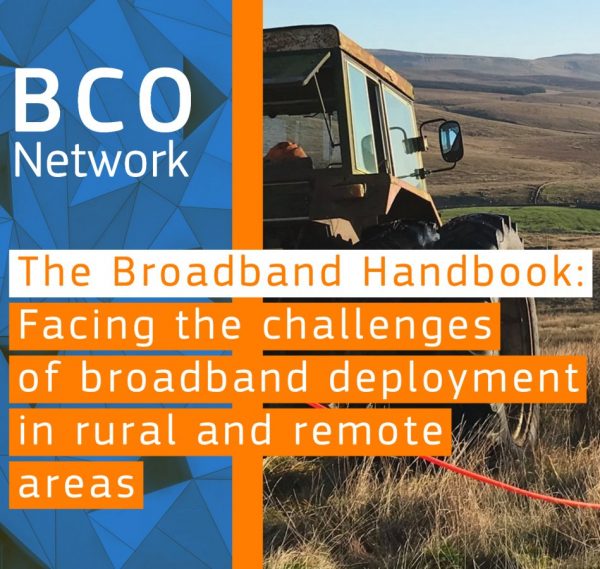EU Publish Handbook to Help New Rural Broadband Networks

The European Commission (EC) has published a “dedicated handbook” for rural policy makers and broadband project managers who plan to roll-out new ISP networks into remote areas, which uses examples from the UK (e.g. B4RN etc.) and other EU countries to show how the job can be done both “effectively and efficiently.”
The broadband handbook (PDF) itself is over 22MB (MegaBytes) in size and 46 pages long. The overview it provides is a fairly general one, although it should offer a useful starting off point for anybody who might be considering their own network. In fact it’s definitely one of the more readable examples of such a guide.
The first part of the handbook makes the case for rural and remote area broadband investment and outlines the technological solutions, the European broadband targets and progress, and sources of EU funding and support for broadband (it should be mentioned that funding for related projects has also come from communities, the private sector and other public funding sources etc.).
Advertisement
Finally, the second part presents examples of good practices that rural and remote communities have used to solve the issue of broadband connectivity. It outlines the solutions implemented, taking into account social, territorial and economic aspects. It also addresses lessons learned from unsuccessful cases and defines a simple framework covering the key issues.
Mark is a professional technology writer, IT consultant and computer engineer from Dorset (England), he also founded ISPreview in 1999 and enjoys analysing the latest telecoms and broadband developments. Find me on X (Twitter), Mastodon, Facebook, BlueSky, Threads.net and Linkedin.
« Virgin Media Broadband Covers 150000 Extra N.Ireland Premises
KCOM Owner Macquarie to Break Up Business – Focus on Core »






















































Mark, any chance you can cover FTTC capacity issues again, in light of the coronavirus pandemic and the recent massive uptake in remote working.
It appears that some rural areas have seen a massive uptake in the last 6 weeks, with many switching from ADSL to FTTC/FTTP as a result of the need for remote working, leaving some Market 1 (funded through the BKUK/Superfast Cymru Programme) Openreach cabinets at capacity, with no recourse. Openreach are uncontactable for capacity issues. ISP’s refer you to Openreach, Openreach refers you to ISPs.
The problem here is there is little incentive to increaase capacity to allow migrations/new FTTC connections, as rurally BT are often the biggest ISP.
This is obfuscated by the wording used on the Openreach website, because rather than state a cabinet has reached capacity, it just states “Openreach is working hard to bring you Superfast Broadband”.
Interesting too, if this could be a breach of contract issue in terms of the Superfast Cymru contract, as Fibre is no longer available to order on certain cabinets that have been funded by the Welsh Government, as an example.
This could be a big issue for small market towns, where local companies have ceased/cancelled their fibre connection due to having to shut the business during the pandemic, and when looking to restart the business, are unable to re-order FTTC they need to get their business back up again.
Would Think Broadband have up to capacity data on this? Spoke to Ofcom, (as useless as a chocolate teapot), they said there is no legal obligation for Openreach to provide new increased capacity aka. Fibre is a ‘luxury’ non-essential product, they said they didn’t have a current percentage of the number of FTTC cabinets that are currently not accepting new orders due to capacity issues.
Compare that to companies expecting everyone to use this technology to work from home, Ofcom are giving out a real mixed message here.
Can do something but no-one ever gets that excited about it in the past so tends not to be on the top of the list.
While there is no legal obligation Openreach generally does add extra capacity, but it can take time and how much varies from area to area and what is needed for the upgrade.
I can tell you what the official situation was toward the end of 2019 (there’s currently no official data that I’ve seen for 2020). Openreach had about 90,000 live FTTC cabinets across 5,400 exchanges and 2.7% of those cabinets were declared as having “waiter” status, which tends to cover cabinets where there are no spare ports available.
This is of course a % of cabinets and not reflecting a % of broadband coverage impact.
I’m sympathetic to the plight as it must be infuriating to not be able to upgrade.
I’d be surprised if OR didn’t add more ports/line cards as this is an extra income stream for them. So if the demand is there then it is a commercial no brainer to provision it. ££££ talk.
Problem may be timelines on getting the hardware from China.
And in some cases where it is a small DSLAM and it has already had an expansion pod fitting another might not be so easy as it might mean putting a whole new DSLAM in place and then is there enough pavement space to do the job.
Some locations where FTTP is close to go live or is live they won’t want to invest in the copper estate, quite reasonably, as this will give a kick to FTTP migration.
I’m not seeing a breach of contract issue. Openreach were tasked with upgrading specific cabinets for a set amount of money by the councils who held the funds.
If I ask a builder to extend my house because we’re expecting a baby and then we turn out to have triplets, I have no legal recourse to demand that my builder make the extension larger.
I don’t know why ISPs are telling you to talk to Openreach. Discussions about local network capacity aren’t supposed to take place between OR and end customers.
Just use 4G instead?
@ 125us
According to “housewife law” we builders know everything they were thinking – even if they never told us.
Remember “always blame the bloody builder” even if it was clearly the client’s issue.
This way the client always has a reason for not paying the bill at all/on time (delete as appropriate).
Honestly, you do run into some extraordinary arguments constructed to self justify appalling client behaviour. People then convince themselves there is validity to these bogus constructs and cling to them like a life raft.
But you have warning about the extra babies and can if you wish make allowances.
Indeed, but I can’t demand that the builder make the extension larger at his expense because I didn’t know I was going to have triplets when I contracted with him.
Can we have a whip-round and buy Connecting Devon & Somerset a copy, they clearly need help..